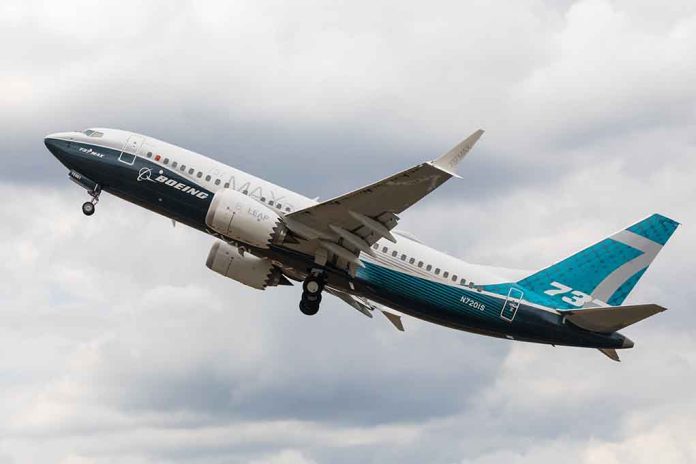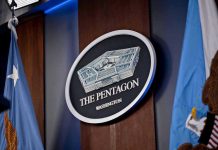
Boeing escapes criminal trial for 737 MAX crashes that killed 346 people by agreeing to a staggering $1.1 billion settlement with the Department of Justice that includes admission of criminal fraud.
Key Takeaways
- Boeing has admitted to conspiring to defraud the Federal Aviation Administration (FAA) regarding the 737 MAX aircraft that crashed twice, killing 346 people.
- The $1.1 billion settlement includes $444.5 million in victim compensation, $487.2 million in fines, and $455 million for safety improvements.
- A federal judge has canceled the criminal trial that was scheduled for June 23 in Fort Worth, Texas, pending final approval of the settlement.
- Boeing’s board members will be required to personally meet with families of crash victims as part of the accountability measures.
- The non-prosecution agreement allows Boeing to avoid criminal charges while still admitting guilt for its deceptive practices.
Boeing Admits Criminal Fraud to Avoid Trial
The aerospace giant Boeing has managed to avoid criminal prosecution for the two deadly 737 MAX crashes by signing a $1.1 billion settlement with the Department of Justice. The non-prosecution agreement, finalized on May 29 and disclosed in a June 4 SEC filing, involves Boeing’s admission to conspiring to defraud the Federal Aviation Administration about the safety of its 737 MAX aircraft. This deception directly led to the crashes of Lion Air Flight 610 and Ethiopian Airlines Flight 302, which together claimed 346 lives. U.S. District Judge Reed O’Connor has vacated the trial date that was initially set for June 23 in Fort Worth, Texas, though he must still approve the final settlement terms.
The settlement structure requires Boeing to pay a substantial fine of $487.2 million to the federal government. Additionally, the company must create a $444.5 million fund specifically designated for compensating the families of crash victims. This financial arrangement signals a significant admission of responsibility, though many victim advocates have criticized the deal as insufficient given the scale of the tragedy. The remaining $455 million will be invested in Boeing’s internal safety and compliance programs, addressing the systemic failures that enabled the fatal design flaws to remain unaddressed.
#Boeing has reached a non-prosecution agreement with the U.S. Department of Justice (#DOJ), allowing it to avoid criminal prosecution over the two deadly #737MAX crashes (#LionAir and #EthiopianAirlines) in 2018 and 2019 that killed 346 people.
📷©️AP | REUTERS/Tiksa Negeri#US pic.twitter.com/Sf1SQlab4D
— FlightMode (@FlightModeblog) May 28, 2025
Victim Compensation and Corporate Accountability
A key element of the settlement is the creation of a substantial victim compensation fund. Nearly half a billion dollars will be directed to the families of the 346 people who lost their lives in the two crashes. The Department of Justice has taken steps to inform these families about the motion to dismiss the criminal fraud charge against Boeing, in accordance with the federal Crime Victims’ Rights Act. This communication represents an acknowledgment of the profound impact these crashes had on hundreds of families worldwide who lost loved ones due to Boeing’s deceptive practices.
“Boeing is committed to complying with its obligations under this resolution, which include a substantial additional fine and commitments to further institutional improvements and investments,” said Boeing in a statement. “The resolution also provides for substantial additional compensation for the families of those lost in the Lion Air Flight 610 and Ethiopian Airlines Flight 302 accidents. We are deeply sorry for their losses, and remain committed to honoring their loved ones’ memories by pressing forward with the broad and deep changes to our company that we have made to strengthen our safety system and culture.”
Beyond financial compensation, the agreement includes a requirement that Boeing’s board members personally meet with families of the victims. This unprecedented measure aims to humanize the corporate accountability process and ensure that company leadership confronts the human cost of their decisions directly. The DOJ has characterized this settlement as a way to secure meaningful accountability while providing substantial and immediate public benefits in a case with otherwise uncertain outcomes.
Safety Improvements and Future Implications
The $455 million earmarked for safety and compliance improvements represents a crucial investment in preventing similar tragedies in the future. Boeing has pledged to implement comprehensive changes to its safety culture and systems, addressing the fundamental flaws that allowed the 737 MAX to enter service despite having serious design defects. These improvements include enhanced oversight, better communication channels for safety concerns, and more rigorous testing protocols. The settlement also establishes ongoing monitoring to ensure Boeing follows through on these commitments.
“The settlement secures meaningful accountability, delivers substantial and immediate public benefits, and brings finality to a difficult and complex case whose outcome would otherwise be uncertain,” said the government in its court filings.
Critics argue that allowing Boeing to avoid criminal prosecution sets a dangerous precedent for corporate accountability in cases involving loss of life. However, proponents of the settlement point to the substantial financial penalties and the explicit admission of criminal fraud as significant concessions from the company. The agreement represents one of the largest corporate settlements in recent history and establishes important benchmarks for how aviation safety violations will be handled in the future. With the trial date now vacated, all eyes turn to Judge O’Connor’s final decision on whether to approve this settlement or potentially reschedule the criminal trial.













